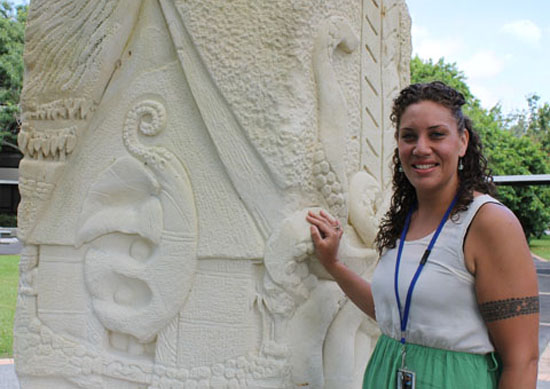
The impact of Manukau’s first university is already being felt, with AUT University awarding its first Manukau PhD scholarship to a recipient whose research is set to benefit the local community.
Winner Salainaoloa Wilson will commence her PhD this year, researching Samoan language maintenance and preservation.
Wilson’s research will focus on South Auckland in particular, as there are a significant number of Pacific Island people living there. However, the research will also extend back to the homeland of Samoa.
“The Samoan language is increasingly at risk,” says Wilson. “I worry about what’s going to happen in the future – if we lose the language, especially with our younger people coming through - if we don’t make changes now, what’s going to happen in the future? That’s what drives me.”
Wilson, who is fluent in Samoan and English, grew up with her Samoan mother and European father, both of whom speak fluent Samoan, and encourage the language to be spoken regularly at home.
“Speaking the language at home is such an important start,” says Wilson. “Many people feel that even if they don’t speak Samoan in New Zealand, they always have the homeland to fall back on.
"But one of my master’s findings was that a language shift is also occurring there. English is being increasingly spoken in Samoa, especially in urban areas, which is starting to pose a real risk to the Samoan mother tongue.
Multiple jobs
“I can see language loss occurring in my own family, with cousins and so on, and this is the main reason why I started researching into this area. Many Samoan parents work multiple jobs, and shift work, so there is little time to spend enriching the language at home.
"I hope that my research will identify some initiatives that we can implement as part of a revitalisation strategy.”
Presently, less than half of New Zealand-born Samoans can speak Samoan, despite the broader, recognised benefits of bilingualism. Says Wilson, “Being bilingual has generic cognitive benefits, which means you’re more likely to succeed in other aspects of learning - it helps you acquire other, seemingly unrelated skills.
"But it also means you are connected with and understand your culture, which you can’t really do unless you have the language. Knowing your mother tongue is a marker of identity.”
Winning the scholarship has confirmed to Wilson that moving to Auckland and pursuing an academic career was the right thing to do. “It was so hard to leave my family behind in Wellington, but winning the scholarship has shown me that this is where I’m meant to be; that there are opportunities here for me. It was so exciting to win – my family is so happy for me.”
Wilson will be one of many postgraduates studying at AUT’s contemporary new campus in Manukau.
“AUT’s Manukau campus is the perfect environment in which to study,” says Wilson. “It’s away from the hustle and bustle of the city, I have all the resources I need, as well as great support from colleagues here.
"My supervisor, Professor Peggy Fairbairn-Dunlop, is my role model and mentor. My dream is to be an academic in the area of Samoan or Pacific Studies.”
Spasifik magazine

This work is licensed under a Creative Commons Attribution-NonCommercial 3.0 New Zealand License.



